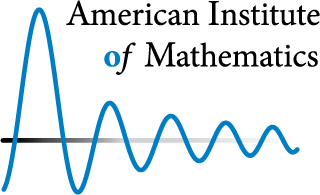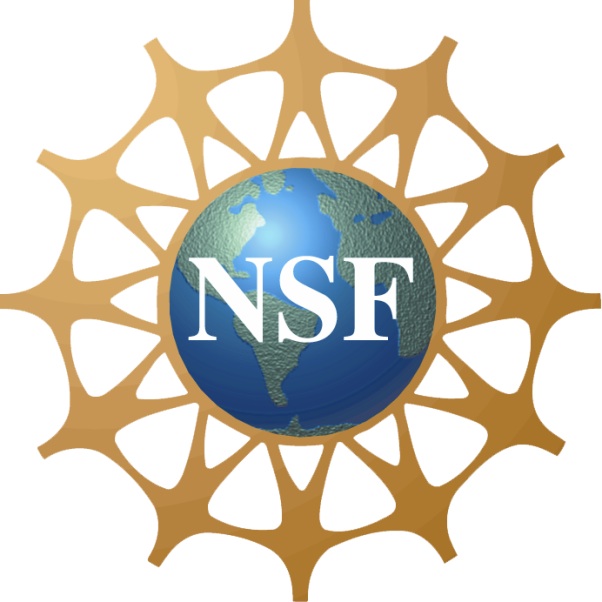This AIM Research Community (ARC), sponsored by AIM and the NSF, began in 2021 and focuses on combinatorial and linear algebraic problems related to inverse eigenvalue problems related to graphs. The inverse eigenvalue problem for graphs (IEPG) is to determine if a given set of real numbers is the spectrum of a matrix with a given graph. This problem and related variants have been of interest for many years and recently developed tools have accelerated progress and opened up new lines of inquiry. Zero forcing (ZF) is a propagation process on graphs. ZF has become a fundamental concept because it represents a nice bridge between combinatorics and linear algebra. ZF has also arisen independently in quantum information processing, monitoring electrical power networks, and graph search algorithms.
The primary scientific goals of this AIM research community are to
- use all the tools--recently developed matrix theoretic ones, combinatorial approaches developed for ZF and other tools from algebra and analysis--to make significant progress on the IEPG; and
- investigate new lines of zero forcing (ZF) and its variants.
This ARC is designed to bring a diverse group of researchers into the IEPG-ZF area and enhance collaboration and sense of community. In particular, the community will support graduate students, early career researchers, and faculty at primarily undergraduate institutes, by providing them a network of collaborators and opportunities to expand their research interests and establish successful research programs.
Collaborative research groups are used to attack problems related to the IEPG and ZF. This ARC operates on an approximately annual cycle of research group formation, beginning with moderated problem sessions to identify significant research problems. AIM-style voting is then used to form new research groups. The groups collaborate, usually for a year or more, write up their results, and submit them for publication. The time commitment associated with any one research group is limited.
If you would like to participate, please apply by filling out the on-line form. Applications are open to all, and we especially encourage women, underrepresented minorities, and researchers from primarily undergraduate institutions to apply.
Information about current and past activities:
Upcoming events
Note: For upcoming events, we list events that we believe are of interest to the community, regardless of whether they are organized specifically by the IEPG-ZF ARC.
- JMM 2025. AIM Special Session on Applications and Generalizations of Zero Forcing. Seattle, January 11 2025. Organizers: Mary Flagg, University of St. Thomas, and Veronika Furst, Fort Lewis College.
- JMM 2025. ILAS Special Session on Strong Properties of Matrix Classes. Seattle, Jan. 8, 2025. Organized by Bryan L Shader, University of Wyoming, and Minerva Catral, Xavier University
- JMM 2025. ILAS Special Session on 05C50 Offline. Seattle, Jan. 10, 2025. Organized by Hermie Monterde and Stephen Kirkland, University of Manitoba.
- Southeastern International Conference on Combinatorics, Graph Theory & Computing (SEICCGTC) 2025. Special Session on graphs and matrices. Florida Atlantic University, Boca Raton, March 3-7, 2023. Organizers: Mary Flagg, University of St. Thomas, and Leslie Hogben, Iowa State University and American Institute of Mathematics.
Past events
Note: For past events, we list only events that were organized by the IEPG-ZF ARC.
- Joint Mathematics Meetings (JMM) 2024 AIM Special Session on Graphs and Matrices, San Francisco. January 4 - 5, 2024. Organizers: Mary Flagg, University of St. Thomas, and Bryan A Curtis, Iowa State University.
- Southeastern International Conference on Combinatorics, Graph Theory & Computing (SEICCGTC) 2023. Special Session on Matrices and graphs. Florida Atlantic University, Boca Raton, March 6-10, 2023. Organizers: Bryan Curtis and Leslie Hogben, Iowa State University.
- JMM 2023. ILAS - AIM Special Session on The Inverse Eigenvalue Problem for a Graph and Zero Forcing. Boston, January 5-6, 2023. Organizers: Mary Flagg, University of St. Thomas, and Bryan A Curtis, Iowa State University.
- JMM 2022. ILAS Special Session on The Inverse Eigenvalue Problem for a Graph, Zero Forcing, Throttling and Related Topics. Virtual, April 6-9, 2022. Organizers: Mary Flagg, University of St. Thomas, and Hein Van der Holst, Georgia State University.
Publications produced by research groups of the IEPG-ZF ARC:
- An inverse eigenvalue problem for structured matrices determined by graph pairs. A.H. Berliner, M. Catral, M. Cavers, S. Kim, P. van den Driessche. Linear Algebra Appl. 699 (2024), 586--603
- Compatible Forts and Maximum Nullity of a Graph. Veronika Furst, John Hutchens, Lon Mitchell, Yaqi Zhang. https://arxiv.org/abs/2407.03492
- The allow sequence of distinct eigenvalues for a sign pattern. Jane Breen, Carraugh Brouwer, Minerva Catral, Michael Cavers, Pauline van den Driessche, Kevin N. Vander Meulen. Electron. J. Linear Algebra 40 (2024): 48-80. https://journals.uwyo.edu/index.php/ela/article/view/7779
- The inverse nullity pair problem and the strong nullity interlacing property. Aida Abiad, Bryan A. Curtis, Mary Flagg, H. Tracy Hall, Jephian C.-H. Lin, Bryan Shader. Linear Algebra Appl. 699 (2024), 539–568.
- Forts, (fractional) zero forcing, and Cartesian products of graphs. Thomas R. Cameron, Leslie Hogben, Franklin H.J. Kenter, Seyed Ahmad Mojallal, Houston Schuerger. https://arxiv.org/abs/2310.17904
- Sparks of symmetric matrices and their graphs. Louis Deaett, Shaun Fallat, Veronika Furst, John Hutchens, Lon Mitchell, Yaqi Zhang. Electron. J. Linear Algebra 39 (2023), 591–606. https://journals.uwyo.edu/index.php/ela/article/view/8025
- Regular Graphs of Degree at most Four that Allow Two Distinct Eigenvalues. Wayne Barrett, Shaun Fallat, Veronika Furst, Shahla Nasserasr, Brendan Rooney, Michael Tait. Linear Algebra Appl. 679 (2023), 127–164. https://www.sciencedirect.com/science/article/abs/pii/S0024379523003488?via%3Dihub
- Bordering of Symmetric Matrices and an Application to the Minimum Number of Distinct Eigenvalues for the Join of Graphs. Aida Abiad, Shaun M. Fallat, Mark Kempton, Rupert H. Levene, Polona Oblak, Helena Šmigoc, Michael Tait, Kevin Vander Meulen. Linear Algebra Appl. 679 (2023), 104–126. https://www.sciencedirect.com/science/article/pii/S0024379523003506?via%3Dihub
- Sparsity of Graphs that Allow Two Distinct Eigenvalues. Wayne Barrett, Shaun Fallat, Veronika Furst, Franklin Kenter, Shahla Nasserasr, Brendan Rooney, Michael Tait, Hein van der Holst. Linear Algebra Appl. 674 (2023), 377–395. https://www.sciencedirect.com/science/article/abs/pii/S0024379523002161?via%3Dihub
- Spectral arbitrariness for trees fails spectacularly. Shaun M. Fallat, H. Tracy Hall, Rupert H. Levene, Seth A. Meyer, Shahla Nasserasr, Polona Oblak, Helena Šmigoc. https://arxiv.org/abs/2301.11073
- Minimum number of distinct eigenvalues allowed by a sign pattern. J. Breen, C. Brouwer, M. Catral, M. Cavers, P. van den Driessche, K.N. Vander Meulen. Linear Algebra Appl. 654 (2022), 311–338. https://www.sciencedirect.com/science/article/abs/pii/S0024379522003202?via%3Dihub
- Isomorphisms and properties of TAR reconfiguration graphs for zero forcing and other X-set parameters. Novi H. Bong, Joshua Carlson, Bryan Curtis, Ruth Haas, Leslie Hogben. Graphs Combin. 39 (2023), no. 4, Paper No. 86, 23 pp. https://link.springer.com/article/10.1007/s00373-023-02677-1
- Power domination reconfiguration. Beth Bjorkman, Chassidy Bozeman, Daniela Ferrero, Mary Flagg, Cheryl Grood, Leslie Hogben, Bonnie Jacob, Carolyn Reinhart. https://arxiv.org/abs/2201.01798


